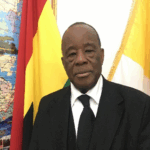
Ghana’s Ambassador to the Holy See, Babate Assorow, has clarified the distinct yet collaborative roles of the Holy See Mission and Ghana’s Embassy in Italy.
Speaking in an interview with Italy-based Ghanaian journalist Maxwell Nkansah, he explained that although both missions operate independently, they ultimately advance the same national objectives.
He emphasized the importance of close cooperation with Ghana’s Ambassador to Italy, Mrs. Mona Helen Kabuki Quartey, whose office oversees bilateral relations with the Republic of Italy, while the Holy See Mission handles matters specific to the Vatican.
According to Ambassador Assorow, the Vatican does not engage in commercial activities in Ghana.
Instead, its support is largely humanitarian, focusing on education, healthcare, and social interventions through the Catholic Church and international NGOs such as Caritas, the Italian Bishops’ Conference, MISEREOR, and MISSIO.
He noted that his office intends to encourage these organisations, along with other faith-based partners, to expand their contributions to Ghana’s development.
Ambassador Assorow stressed that although the Holy See Mission’s core mandate is spiritual and humanitarian support, all Ghanaians in Italy are welcome to seek assistance, regardless of religion. Cases that fall outside the Vatican’s remit are referred to the Embassy in Rome.
“We cannot promise what we cannot give, but we will do our best,” he assured.
He praised the Vatican’s global diplomatic influence, referencing its 84 diplomatic missions accredited to the Holy See and the quiet diplomatic support it provides to partner countries.
Recalling a recent meeting with the Pope, Ambassador Assorow said discussions touched on how the Church could help open doors of opportunity for Ghana.
Addressing the growing number of Ghanaians seeking asylum in Italy, the Ambassador reiterated the Vatican’s commitment to Pope Leo XIV’s advocacy for the fair treatment of migrants.
He stated that his office engages regularly with Vatican departments responsible for human development, charity work, and migration.
Ambassador Assorow also revealed plans to modernise communication between the mission and Ghanaian citizens.
He stressed the need for active social media platforms and a functional website, noting that many people travel long distances for basic information.
“We have to bring diplomatic services to the doorstep of our citizens,” he said.
Looking to the future, he disclosed early discussions around scholarship and exchange programmes, particularly short-term training opportunities for Ghanaian nurses and medical professionals in Catholic-run hospitals across Italy.
He hopes to secure additional scholarships in fields such as economics, law, medicine, fashion, and tourism, especially in northern Italian cities like Milan and Turin.
Though still settling into his role, Ambassador Assorow said he remains committed to accessibility and transparency.
He emphasised that the mission operates an open-door policy and encouraged Ghanaians, especially members of the Catholic community, to engage the Embassy.
“I’m here for the government of Ghana and the people of Ghana,” he noted, adding that collaboration within the embassy is crucial to addressing citizens’ needs.
He acknowledged that challenges are inevitable but called for unity, collective responsibility, and renewed dedication to national development.

